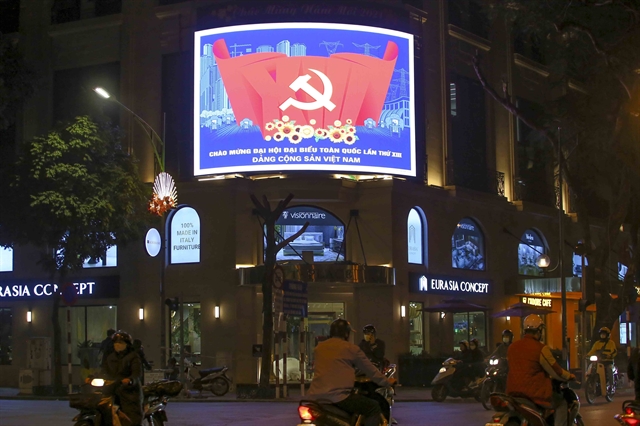 Politics & Law
Politics & Law

The 13th National Party Congress is a milestone in the development of the Party and the nation, according to a high-ranking Party official.

|
| A panel displaying welcome message for the 13th National Party Congress in downtown Hà Nội. — VNA/VNS Photo |
HÀ NỘI — The 13th National Party Congress, which opened yesterday, is a milestone in the development of the Communist Party of Việt Nam and the nation, according to a high-ranking Party official.
In an interview with the Vietnam News Agency, Võ Văn Thưởng, Politburo member, permanent member of the Party Central Committee’s Secretariat and head of the Committee’s Information and Education Commission, said the congress would set forth a vision to mid-21st century, aiming to turn Việt Nam into a socialist-oriented developed country while making sure that continuity and cumulative improvements will be present throughout the entire socialist building efforts.
Việt Nam is set to become a developing nation with modernity-oriented industry and surpass the low-middle-income level by 2025; a developing nation, with modern industry and high middle income by 2030, which marks the 100th anniversary of the Party) and a developed nation with high income by 2045, which marks the 100th founding anniversary of the Socialist Republic of Việt Nam.
The congress would review the implementation of the resolution adopted at the 12th National Party Congress and other documents such as the platform of national construction during the transition to socialism and the socio-economic development strategy for 2011-20, and the assessment of the 35-year of đổi mới (renewal) and 30 years implementing the 1991 Platform.
According to Thưởng, over the past five years, the entire Party, people and army have carried forward solidarity efforts and completed set targets and tasks, creating a premise for the next tenure.
He cited the country’s annual average GDP growth at 6 per cent during the 2016-20 period, along with achievements in education-training, science-technology, culture and social affairs, with the poverty rate dropping to below 3 per cent.
Việt Nam had paid attention to natural resources management, environmental protection and climate change adaptation, he added.
The country had made strides in disease prevention and control, especially COVID-19, he said, stressing the country’s socio-political stability, consolidated national defence and security, expanded external relations, and improved position, prestige and role in the regional and international arena.
Due attention had been placed on Party building and rectification, and the fight against corruption, wastefulness and other bad deeds had reaped marked results, the official went on.
The documents to be submitted to the Congress had been meticulously prepared and deliberated through many rounds and they show harmonisation between the ideological and the practical, between consistency and innovation, on the basis of maximising democracy and engaging efforts from all levels of Party organisations, as well as consideration of feedback from the National Assembly deputies, the Việt Nam Fatherland Front, socio-political organisations, officials and Party members, people from all walks of life, and overseas Vietnamese.
The documents were the synthesis of wisdom and creativity of the Party, the people and the armed forces, showcasing major stances and orientations, the Party’s strategic vision, and the development ambition of the entire people, as well as our political commitment to build and defend the Socialist Republic of Việt Nam, to successfully achieve the goals of “a prosperous people and a strong, democratic, equitable, and civilised country,” Thưởng noted.
The political report stressed not only “persevere with the application of Marxism-Leninism and Hồ Chí Minh Thought”, but also to develop in a creative manner these ideologies, as well as affirmed the need to “stoke up the sense of patriotism and national self-reliance, the ambition to realise the development of a prosperous and happy nation, and utilise the unified strength of the entire political system and the culture and people of Việt Nam,” he said.
The draft documents had also more clearly defined the relationship between observance of market mechanisms and the will to pursue socialism; between the State, market and the society; between economic growth and culture development, environmental protection, and ensuring social equity and progresses. — VNS




